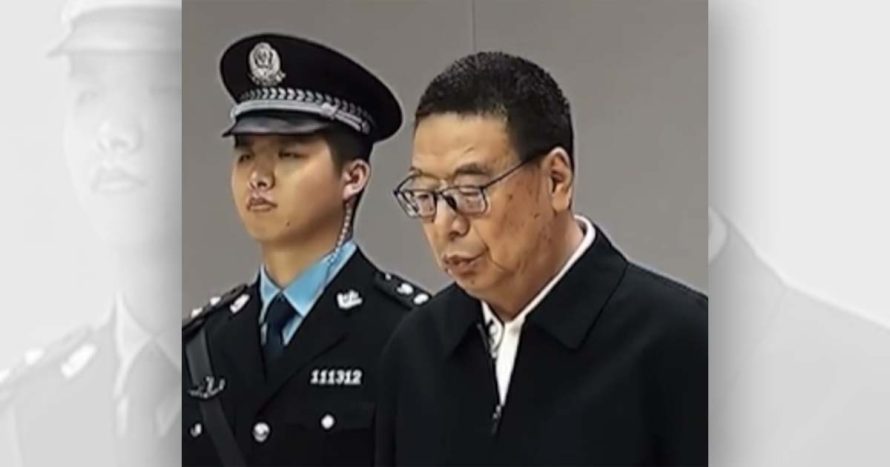In recent days, two senior officials handpicked by the Chinese Communist Party to head the leadership in the Tibet Autonomous Region (TAR) have been prosecuted for misuse of funds exposing the deep ties between corruption and repression in Tibet.
Wu Yingjie, former TAR Party Secretary and previously sanctioned by the US and Canada for human rights violations, has been convicted of corruption while serving in TAR. On 16 July, Beijing No. 3 Intermediate People’s Court sentenced Wu to a death sentence with a two-year reprieve.
Similarly, on 22 July 2025, Chinese state media announced that Che Dralha (Qi Zhala), a Tibetan and former head of the TAR Government, was expelled from the CCP and dismissed from public office for misappropriating public funds. Che and Wu were serving in Lhasa around the same time. In January 2025, the CCP Central Commission for Discipline Inspection and the National Commission of Supervision had launched an investigation against Che. Che is probably the seniormost Tibetan among many others working under the Chinese system who have been subjected to investigation for misusing public funds indicating that corruption is pervasive in the Tibetan areas.
A native of Changyi, Shandong Province, Wu spent 47 years (1974 to 2021) in the TAR in various party-state leadership capacities and was investigated for taking bribes and embezzling RMB 343 million ($47 million) between June 2006 to February 2021. As China prepares a massive external propaganda campaign to commemorate the 60th anniversary of the establishment of the TAR in September, Wu’s conviction serves as a stark reminder of the intersection between corruption and repression in Chinese-ruled Tibet. The Tibetan people bear the brunt of both while the party-state touts its performative “economic development” narrative through state media.
When China announced its usual generic announcement of investigations against Wu in June 2024 without giving specific reasons, ICT had reported that it would most likely be due to his misuse of funds for Tibet.
Wu Yingjie’s case is not isolated. Numerous senior officials across the CCP party-state structure in Tibetan regions, spanning 17 prefectural-level and two county-level “autonomous” administrative divisions, are currently under prosecution or investigation for corruption. A recent International Campaign for Tibet report, Crisis of Credibility: China’s Leaders in Tibet Selected for Loyalty to CCP Over Welfare of Tibetan People, highlights a partial list of these officials, arguing that China’s leadership in Tibet faces a credibility crisis due to ineffective Tibetan representation and rampant corruption and misrule.

The CCP’s anti-corruption campaigns, heavily publicized through state-controlled media, are strategically designed to bolster the Party’s image and legitimacy both domestically and internationally. However, endemic corruption in Chinese-ruled Tibet is pervasive in an environment devoid of checks and balances, independent oversight, and transparency. High-profile prosecutions of officials, such as Wu Yingjie, are trumpeted to showcase the Party’s commitment to rooting out corruption. Yet, these actions often function as political theater to project an illusion of accountability and justice while leaving the broader system of patronage and power untouched.
 China’s 2012-2024 Corruption Perceptions Index (Transparency International)
China’s 2012-2024 Corruption Perceptions Index (Transparency International)
In the absence of a free press, independent judiciary, or vibrant civil society, the CCP maintains unchallenged control over the narrative, portraying itself as a resolute opponent of corruption while suppressing any scrutiny that might expose the depth of systemic graft and mismanagement.
For instance, TAR authorities detained Tibetan environmental human rights defender Tsongon Tsering, who in October 2024 courageously documented illegal sand mining in his native Tsaruma (Chá’ěrmǎ) in Kakhog (Hongyuan) County, Ngaba (Aba), Sichuan, which involved collusion between Anhui Xianhe Construction Engineering Company, the county Discipline Inspection Commission, and the Development Bureau. Similarly, Tibetan businessman, Dorjee Tashi, has been serving a life imprisonment term since 2008 due to false accusations of “loan fraud” by corrupt authorities in the TAR whose demands for real estate were rejected by him. He was framed as a “secessionist” by spiteful and vindictive political and party leaders taking advantage of the political situation in the wake of the mass Tibetan protests. While political charges were later dropped, he was declared guilty of “loan fraud” and sentenced to life imprisonment by the Lhasa Intermediate People’s Court on May 17, 2010. The court of second instance the TAR People’s Higher Court upheld the verdict on July 26, 2010. Dorjee was then 36 years old. Anti-corruption and environment activist Anya Sengdra was sentenced to seven years in prison in December 2019 for his efforts to expose corruption and abuse of power by local officials.
Decades of Chinese rule in Tibet have entrenched a governance model that prioritizes political loyalty to the CCP over accountability to the Tibetan people. Corruption, ranging from bribery and embezzlement to the exploitation of natural resources and cultural heritage, has compounded human rights abuses, including restrictions on religious freedom, forced cultural assimilation, and widespread surveillance.
The CCP’s widespread propaganda apparatus works in tandem to obscure these realities, especially as it prepares for high-profile events like the 60th anniversary of the TAR in September 2025. As the conviction of Wu Yingjie shows, the CCP’s selective crackdowns and tightly controlled propaganda efforts reveal an insecure regime more concerned with preserving its authority than addressing the root causes of corruption or the broader injustices faced by Tibetans under its rule.